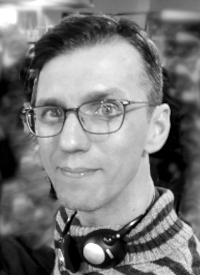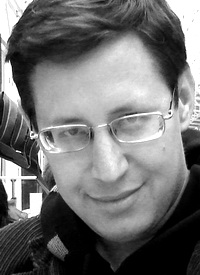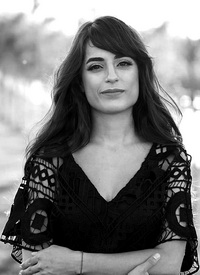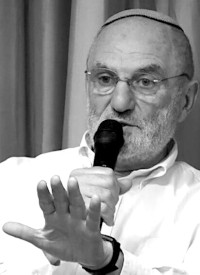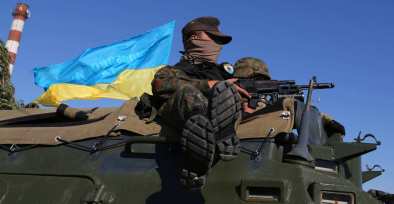
Ukrainian parliamentary elections held on October 26 primarily showed the reality of the country’s split. The turnout was much lower than in all previous elections and the map of turnout shows the split and division of the country – the fact that is being constantly masked by Ukrainian nationalists and the authorities recently brought by them to power.
Half of eligible voters boycotted the elections, since they don’t see any use of it and since their will was again violated last February during the coup. Thus, Ukraine has a parliament and president representing actually a part of the country, a fact which inevitably contributes to the escalation of the civil war. The whole election campaign was held in the atmosphere of intimidation and terror of political opponents, that reminds of the election in Germany 1933 – “free and fair” despite the permanent attacks and terror against the left, trade-unions and dissenters.
President Poroshenko greeted the results of the election saying, “at last there will be no more communists in the Parliament”. Actually, there will be no more of any kind of left or even social-democrats – the staff of the new Parliament is almost completely rightwing and neoliberal.
How did they manage to oust their political opponents? For that purpose, various paramilitary thugs of nazi hooligans, Right Sector and unidentified armed gangs were used. Let’s recall just some recent incidents.
“On Saturday, September 27, the Communist Party (KPU) had called a ‘march for Peace’. The call was banned by the authorities and the rally was attacked by fascist thugs. The police then proceeded to arrest dozens of protesters, including the First Secretary of the Kharkov KPU. Before that, the fascist thugs burnt Communist Party flags and materials.
The following day, the police and National Guard permitted and protected a ‘Ukraine unity’ march which ended in the destruction of the large, historic statue of Lenin in the city center by fascist thugs. Many of them were masked, carrying weapons and displaying neo-Nazi symbols as well as symbols of the Ukrainian Insurgent Army (UPA), which collaborated with the Nazis during WWII and carried out a genocide of the Poles in Western Ukraine.
At the forefront of the crowd overthrowing the statue were militants of the neo-Nazi Social-Nationalist Assembly, Azov Regiment and the far-right Svoboda party. The action was cheered by Ukraine Interior (police) Minister Arsen Avakov.
On September 18, a gang of fascist thugs drawn mainly from ultras from the local Metallist football team attacked a Communist Party rally protesting against price increases and Kiev’s so-called Anti-Terrorist Operation against the Donbass region. The tactic of using football hooligans bussed in from other towns to terrorise your opponents and encourage your own side was already used in several cities in the days leading to the Odessa massacre on May 2nd in which far right Kharkov Metallist football hooligans played a role.
On September 14, ultras from Carpathians and Vorskla also marched together with soldiers from the neo-Nazi Azov Battalion in another ‘march for unity’ before a local football match. In Dnipropetrovsk, Communist Party leaders were arrested without warrant on Sept. 1.
Add to this the violent campaign by the far right against opposing officials and politicians who are not even necessarily left wing. Resembling lynching brigades, radical, right-wing gangs have taken to attacking elected officials in Ukraine by throwing them into trash bins, reports RT news.
The Telegraph (UK) reports, “Since early September, up to a dozen MPs, city councillors and other officials accused of wrong doing have been hauled from their offices by masked gangs in what has become known as the ‘Trash Bucket Challenge’. The perpetrators - often members of the radical right-wing group Right Sector - say the public humiliations are to punish the corruption and criminality that characterised the previous regime. But critics warn the attacks are just one step away from mob justice and public lynchings.”
Thus, we see again how ‘inconvenient’ candidates or parties are targeted by means of far-right violence in order to achieve the desired result – adoption of austerity measures, including cuts to social spending, and a continuation of the war against Ukraine’ own people.
The extraordinary elections were mostly needed to have an obedient parliament able to adopt unpopular laws and spending cuts. As Marxist economist Michael Roberts wrote in August, “New President Poroshenko, one of Ukraine’s feuding oligarchs (in his case, the confectionery king), has dissolved parliament and called elections for 26 October.
“The election will probably lead to the removal of all the old supporters of the ousted pro-Russian former president still in parliament. They have been blocking attempts by the current caretaker prime minister Arseniy Yatsenyuk to carry out the dictates of the IMF under the $17bn ‘reform’ programme agreed last April. In return for IMF money to meet foreign debts and fund the state (for arms mostly), the Kiev government agreed to huge cuts in public spending, pensions and welfare and, above all, to privatise state agencies and raise energy charges for heating and fuel by over 40%, a total reduction of government spending of 6.75% of GDP.”
Thus, we see the same pattern as during the Maidan protests earlier this year – use of far-right thugs and outright fascists to push through neoliberal agenda and adopt austerity measures.
In the new parliament we’ll see many far-right nationalists, especially commanders of paramilitary battalions who were included in the party lists.[1] Among them is Andriy Biletsky, commander of the neo-Nazi battalion Azov and leader of the fascist party Social-National Assembly. As reports BBC, the SNA’s stated aim includes, "to prepare Ukraine for further expansion and to struggle for the liberation of the entire White Race from the domination of the internationalist speculative capital, and to punish severely sexual perversions and any interracial contacts that lead to the extinction of the white man". The Azov Battalion is armed and trained by Ukraine's interior ministry.
Among other winners in the new Parliament are leaders of the Right Sector, including its leader, Dmytro Yarosh, and Boryslav Bereza and Andriy Denysenko. Yarosh topped the poll in the district in Dnipropetrovsk where he ran.
A no less dangerous symptom of the far-right rise is the election result for the Radical Party of Oleg Lyashko. He is associated with the Azov Battalion. Amnesty International recently warned about him, accusing him of torture and abductions.
The group wrote in August, “In the broader context of a deteriorating security situation in the east, Amnesty International has recently raised its concerns with the Ukrainian authorities about one particularly errant MP who has been “detaining” – in effect abducting – and ill-treating individuals across the region. He is called Oleg Lyashko and is the leader of the pro-Ukrainian Radical Party, a member of the Ukrainian Parliament and a former presidential candidate. He travels in the company of muscular armed young men in military fatigues and the ubiquitous camera to record his exploits.”
The Radical Party won 7.5 per cent and among the candidates it brings into Parliament is the notorious, extreme nationalist Yuriy Shukhevich. He is the son of Roman Shukhevich, a Nazi war criminal responsible for the Holocaust and genocide of civilians in Ukraine and Belarus during WWII.
Another Radical party deputy in the new Parliament is Ihor Mosiychuk, a leader of the Social-National Assembly and one of the commanders of the Azov Battalion.
The most dangerous trend of all is that mainstream, “respectable”
parties have adopted ultra-nationalist rhetoric and agenda while introducing
neo-Nazis in their ranks and promoting them to the highest positions. As one analyst
commented about this trend, “The fact that the nominal fascists in Ukraine
didn't do that well at the ballot box is partially down to the political
'centre' moving so far to the right as to almost dispense with the need for a
far right political offering in the first place. That the current prime
minister is doing deals with [Dmytro] Yarosh and standing down his own
candidates to give Yarosh a clear run, and that the Popular Front is stuffed
full of people like Andriy Parubiy [the founder
of Social-National Party], speaks volumes to that.”
And as Peter Mikhailenko writes for In Defence of Marxism,
“While Svoboda has been losing support, it certainly does not correlate with
reduced influence of the far-right. In order to see this, one has to merely
look at the election strategy of the People’s Front. As mentioned, the PF is an
alliance between pro-Western oligarchs and leaders of the National Guard
battalions, including many elements of the far-right such as Tetyana Chornovol,
a far right activist who until recently was a leading figure in the far-right
organization UNA-UNSO [Ukrainian militant far-right organization responsible
for a number of violent assaults].”
The leader of the Ukrainian revolutionary Marxist organization Borotba, Sergei Kirichuk, commented on the election outcome, writing, “The far-right nationalist electorate is still here. Moreover, it has grown considerably and expanded while voting for several right wing parties. The traditional supporters of the left have not gone away, but they, unlike the left, such as the leadership of the Communist Party, have no parliamentary illusions. Millions of people have realized that their participation in the elections is absolutely useless because the very elections are organized in such a way to deliberately to deprive them of any representation and ignore their position”.
While diverting people with nationalist rhetoric and suppressing social protests by the use of far-right paramilitaries, the government will go on plundering the country and imposing social cuts without any serious challenge from its official opposition. In the economic sphere, the future parliamentary coalition has already announced plans for mass sale and privatization of public companies.
The draft of the future governing coalition agreement implies such drastic measures as changing the Labor Code to restrict workers’ rights, adopting the right to fire workers without trade union approval, cancellation of the ban on reducing the number of hospitals and clinics, privatization of coal mines and railroads, rejection of price regulation for agricultural products, etc. Thus, we see that the plans of the new government and Parliament are mostly neoliberal ‘reforms’ – deregulation, privatization and other miracles demanded by the International Monetary Fund.
Meanwhile, industrial production in August fell 21.4 per cent compared to August 2013. It dropped 16.6 per cent in September compared to one year earlier. Imports were down 23.5 per cent during the past nine months compared to the same period of the 2013. Exports fell by 6.8 per cent, despite all the promises from the EU about more favorable trading terms coming into place.
In such a drastic situation of near economic collapse, the Ukrainian government relies only on a strategy of permanent war with own people, including media censorship and far-right terror. But it needs money for this. The only source to pay for military adventures, far-right thugs and profits for the ruling oligarchs is subsidies and loans thanks to western taxpayers. Only large sums of money and outright terror can keep in power this government and Parliament, which in reality represent only a minority of the country.
Notes:
[1] According to Ukraine’s election law and
procedures, approximately half the members of the Ukraine Parliament (Rada) are
apportioned to those parties which gain more than five per cent of the vote.
Kolesnik Dmitriy
-
Історія
Африка и немцы - история колонизации Намибии
Илья Деревянко история колонизации Намибии>> -
Економіка
Уолл-стрит рассчитывает на прибыли от войны
Илай Клифтон Спрос растет>> -
Антифашизм
Комплекс Бандеры. Фашисты: история, функции, сети
Junge Welt Против ревизионизма>> -
Історія
«Красная скала». Камни истории и флаги войны
Андрій Манчук Создатели конфликта>>

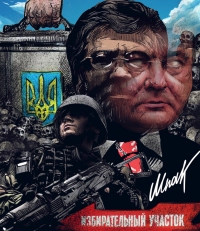
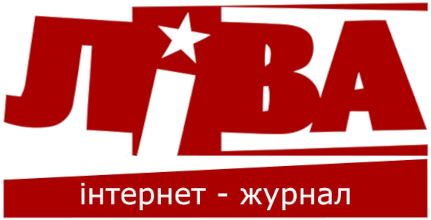










 RSS
RSS
